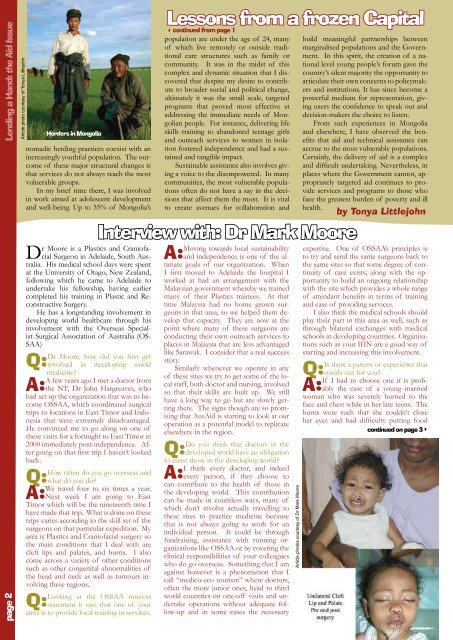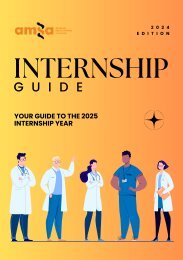Create successful ePaper yourself
Turn your PDF publications into a flip-book with our unique Google optimized e-Paper software.
Lending a Hand: the Aid <strong>Issue</strong><br />
page 2<br />
Article photo courtesy of Tonya Littlejohn<br />
nomadic herding practices coexist with an<br />
increasingly youthful population. The outcome<br />
of these major structural changes is<br />
that services do not always reach the most<br />
vulnerable groups.<br />
In my brief time there, I was involved<br />
in work aimed at adolescent development<br />
and well-being. Up to 55% of Mongolia’s<br />
Dr Moore is a Plastics and Craniofacial<br />
Surgeon in Adelaide, South Australia.<br />
His medical school days were spent<br />
at the University of Otago, New Zealand,<br />
following which he came to Adelaide to<br />
undertake his fellowship, having earlier<br />
completed his training in Plastic and Reconstructive<br />
Surgery.<br />
He has a longstanding involvement in<br />
developing world healthcare through his<br />
involvement with the Overseas Specialist<br />
Surgical Association of Australia (OS-<br />
SAA)<br />
Dr Moore, how did you first get<br />
Q: involved in developing world<br />
medicine?<br />
A:<br />
A few years ago I met a doctor from<br />
the NT, Dr John Hargreaves, who<br />
had set up the organization that was to become<br />
OSSAA, which coordinated surgical<br />
trips to locations in East Timor and Indonesia<br />
that were extremely disadvantaged.<br />
He convinced me to go along on one of<br />
these visits for a fortnight to East Timor in<br />
2000 immediately post-independence. After<br />
going on that first trip I haven’t looked<br />
back.<br />
How often do you go overseas and<br />
Q: what do you do?<br />
We travel four to six times a year.<br />
A:<br />
Herders in Mongolia<br />
Next week I am going to East<br />
Timor which will be the nineteenth time I<br />
have made that trip. What is done on these<br />
trips varies according to the skill set of the<br />
surgeons on that particular expedition. My<br />
area is Plastics and Craniofacial surgery so<br />
the main conditions that I deal with are<br />
cleft lips and palates, and burns. I also<br />
come across a variety of other conditions<br />
such as other congenital abnormalities of<br />
the head and neck as well as tumours involving<br />
these regions.<br />
Looking at the OSSAA mission<br />
Q: statement it says that one of your<br />
aims is to provide local training in services.<br />
Lessons from a frozen Capital<br />
3continued from page 1<br />
population are under the age of 24, many<br />
of which live remotely or outside traditional<br />
care structures such as family or<br />
community. It was in the midst of this<br />
complex and dynamic situation that I discovered<br />
that despite my desire to contribute<br />
to broader social and political change,<br />
ultimately it was the small scale, targeted<br />
programs that proved most effective at<br />
addressing the immediate needs of Mongolian<br />
people. For instance, delivering life<br />
skills training to abandoned teenage girls<br />
and outreach services to women in isolation<br />
fostered independence and had a sustained<br />
and tangible impact.<br />
Sustainable assistance also involves giving<br />
a voice to the disempowered. In many<br />
communities, the most vulnerable populations<br />
often do not have a say in the decisions<br />
that affect them the most. It is vital<br />
to create avenues for collaboration and<br />
Interview with: Dr Mark Moore<br />
Moving towards local sustainability<br />
A: and independence is one of the ultimate<br />
goals of our organization. When<br />
I first moved to Adelaide the hospital I<br />
worked at had an arrangement with the<br />
Malaysian government whereby we trained<br />
many of their Plastics trainees. At that<br />
time Malaysia had no home grown surgeons<br />
in that area, so we helped them develop<br />
that capacity. They are now at the<br />
point where many of these surgeons are<br />
conducting their own outreach services to<br />
places in Malaysia that are less advantaged<br />
like Sarawak. I consider that a real success<br />
story.<br />
Similarly whenever we operate in any<br />
of these sites we try to get some of the local<br />
staff, both doctor and nursing, involved<br />
so that their skills are built up. We still<br />
have a long way to go but are slowly getting<br />
there. The signs though are so promising<br />
that AusAid is starting to look at our<br />
operation as a potential model to replicate<br />
elsewhere in the region.<br />
Do you think that doctors in the<br />
Q: developed world have an obligation<br />
to assist those in the developing world?<br />
A:<br />
I think every doctor, and indeed<br />
every person, if they choose to<br />
can contribute to the health of those in<br />
the developing world. This contribution<br />
can be made in countless ways, many of<br />
which don’t involve actually travelling to<br />
these sites to practice medicine because<br />
that is not always going to work for an<br />
individual person. It could be through<br />
fundraising, assistance with running organizations<br />
like OSSAA or by covering the<br />
clinical responsibilities of your colleagues<br />
who do go overseas. Something that I am<br />
against however is a phenomenon that I<br />
call “medico-eco tourism” where doctors,<br />
often the more junior ones, head to third<br />
world countries on one-off visits and undertake<br />
operations without adequate follow-up<br />
and in some cases the necessary<br />
Article photos courtesy of Dr Mark Moore<br />
build meaningful partnerships between<br />
marginalised populations and the Government.<br />
In this spirit, the creation of a national<br />
level young people’s forum gave the<br />
country’s silent majority the opportunity to<br />
articulate their own concerns to policymakers<br />
and institutions. It has since become a<br />
powerful medium for representation, giving<br />
users the confidence to speak out and<br />
decision-makers the choice to listen.<br />
From such experiences in Mongolia<br />
and elsewhere, I have observed the benefits<br />
that aid and technical assistance can<br />
accrue to the most vulnerable populations.<br />
Certainly, the delivery of aid is a complex<br />
and difficult undertaking. Nevertheless, in<br />
places where the Government cannot, appropriately<br />
targeted aid continues to provide<br />
services and programs to those who<br />
face the greatest burden of poverty and ill<br />
health.<br />
by Tonya Littlejohn<br />
expertise. One of OSSAA’s principles is<br />
to try and send the same surgeons back to<br />
the same sites so that some degree of continuity<br />
of care exists, along with the opportunity<br />
to build an ongoing relationship<br />
with the site which provides a whole range<br />
of attendant benefits in terms of training<br />
and ease of providing services.<br />
I also think the medical schools should<br />
play their part in this area as well, such as<br />
through bilateral exchanges with medical<br />
schools in developing countries. Organisations<br />
such as your IHN are a good way of<br />
starting and increasing this involvement.<br />
A:<br />
Is there a patient or experience that<br />
Q: stands out for you?<br />
If I had to choose one it is probably<br />
the case of a young married<br />
woman who was severely burned to the<br />
face and chest while in her late teens. The<br />
burns were such that she couldn’t close<br />
her eyes and had difficulty putting food<br />
continued on page 34
















